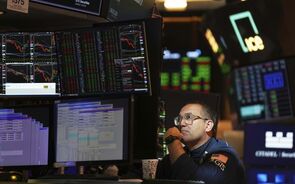Alan Greenspan: unusually clear
1 Mensagem
|Página 1 de 1
Alan Greenspan: unusually clear
Alan Greenspan
Unusually clear
Mar 4th 2004
From The Economist print edition
Straight talk from the Fed's boss
FOR a man who has made a career of balanced nuance, Alan Greenspan, the chairman of the Federal Reserve, has suddenly become, if not a model of clarity, then certainly blunter than is his norm. This week he said that it would be unwise for China to float its currency, the yuan, because such a move might cause money to flee China, destabilising its “quite weak” financial system. An innocuous enough comment, perhaps, except that the Bush administration has been pushing China very hard to revalue the yuan, and in times past Mr Greenspan would have been decidely more guarded in an election year.
Mr Greenspan also had a go at the Chinese and Japanese central banks, which, he said, could not carry on intervening in the currency markets as much as they have, since it will cause inflation (or, as he put it, “The monetary consequences of continued intervention could become problematic”). Japan's dollar reserves, said Mr Greenspan, were already “awesome”, a word not usually employed by the careful central banker.
There is more. America's budget is poised to explode with deficits thanks to over-generous pensions and health benefits. Raise taxes? No, said Mr Greenspan: time to think seriously about cutting benefits and raising the retirement age. An option obvious to any economist, but not to politicians on the election trail and keen to avoid offence.
Unusually, this week Mr Greenspan even strayed far from prepared remarks. In a question-and-answer session following his speech in New York, he was asked whether the Fed has been too lax in preventing asset-price bubbles. Probably not, he said, but there is not enough experience in an era of paper money to know exactly how to deal with such things. “Human nature” lies at the heart of the problem, he said, “and I don't know what monetary policy we can implement to alter human nature.” Some habits are hard to change.
Fonte: www.economist.com
Um abraço,
MozHawk
Unusually clear
Mar 4th 2004
From The Economist print edition
Straight talk from the Fed's boss
FOR a man who has made a career of balanced nuance, Alan Greenspan, the chairman of the Federal Reserve, has suddenly become, if not a model of clarity, then certainly blunter than is his norm. This week he said that it would be unwise for China to float its currency, the yuan, because such a move might cause money to flee China, destabilising its “quite weak” financial system. An innocuous enough comment, perhaps, except that the Bush administration has been pushing China very hard to revalue the yuan, and in times past Mr Greenspan would have been decidely more guarded in an election year.
Mr Greenspan also had a go at the Chinese and Japanese central banks, which, he said, could not carry on intervening in the currency markets as much as they have, since it will cause inflation (or, as he put it, “The monetary consequences of continued intervention could become problematic”). Japan's dollar reserves, said Mr Greenspan, were already “awesome”, a word not usually employed by the careful central banker.
There is more. America's budget is poised to explode with deficits thanks to over-generous pensions and health benefits. Raise taxes? No, said Mr Greenspan: time to think seriously about cutting benefits and raising the retirement age. An option obvious to any economist, but not to politicians on the election trail and keen to avoid offence.
Unusually, this week Mr Greenspan even strayed far from prepared remarks. In a question-and-answer session following his speech in New York, he was asked whether the Fed has been too lax in preventing asset-price bubbles. Probably not, he said, but there is not enough experience in an era of paper money to know exactly how to deal with such things. “Human nature” lies at the heart of the problem, he said, “and I don't know what monetary policy we can implement to alter human nature.” Some habits are hard to change.
Fonte: www.economist.com
Um abraço,
MozHawk
1 Mensagem
|Página 1 de 1
Quem está ligado:


